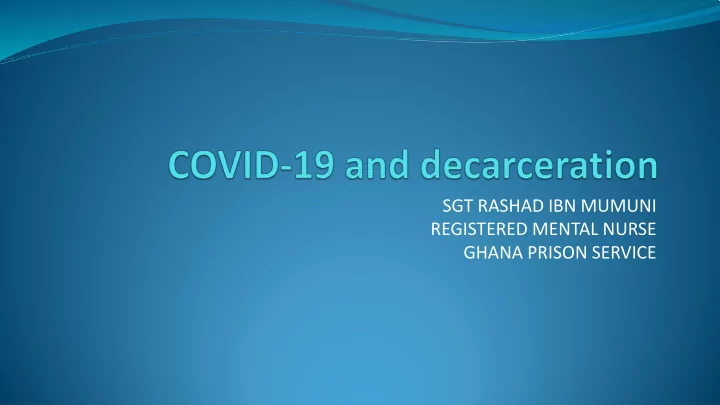

SGT RASHAD IBN MUMUNI REGISTERED MENTAL NURSE GHANA PRISON SERVICE
Q1. From your perspective, how important has decarceration been as a response to COVID-19? Reduction in prison congestion : about 1,594 convicted inmates with varying sentences have been released from prison custody in response to COVID-19. Develop the prison isolation unit in response to holding new convict prisoners and remand prisons for observational purpose before they are finally reintegrated into the major prison cells. Enable the release of most remand prisoners with minor offences who were incarcerated pending pronouncement. Halt in the admission of minor offenders and the aged into prison custody.
Q2. What have been the key issues, opportunities and challenges around this? Can you give examples? ISSUES COVID-19 prevention and control measures alone may prove insufficient for many prion systems plagued by overcrowding and other systemic challenges A large scale testing of prisoners and correctional staff would be necessary, to identify the status of the prison population as well as to check the spread of the virus through isolation and treatment. OPPORTUNITIES Reduction in pressure on usage of prison facilities Reduction in government expenditure with regards to inmates welfare Helped to recognised prison health as public health
CHALLENGES Observing personal hygiene particularly under crowded confinement situations, hygiene protocols such as regular washing of hands, hand sanitization, good cough and sneeze etiquettes are difficult to undertake due to the over population Inadequate supply of personal protective equipments. Lack of adequate professional health staff to screen suspected cases.
Q3. What has been missing from the response in relation to decarceration and what are the impacts of this? Sustaining the modalities in response to decarceration in all prison facilities since most holding facilities are temporal and not fully equipped. Poor addressing system leading to failure in contact tracing of potential COVID-19 cases of visiting relatives. Institute a new visiting model for inmates relatives.
Q4. From your perspective what are the biggest priorities in order to respond sustainably and effectively? FOR THE NEXT YEAR Screening of prisoners and prison staff for COVID-19. A large scale of testing prisoners and prison staff would be necessary, to identify the status of the prison population as well as to check the spread of the virus through isolation and treatment. All potential inmates in police custody should be screened before admission into prison custody. This policy should be made mandatory Provision of PPE Observing personal hygiene
FOR THE NEXT 3 YEARS Expansion of prison facilities: it is important to consider in future, the possibility of expanding prison facilities to meet healthier international and UN accommodation standards for the prison population. Alternative sentences Establish a correctional facility with modern health facilities in every region and also upgrade of existing ones.
THANK YOU
Recommend
More recommend